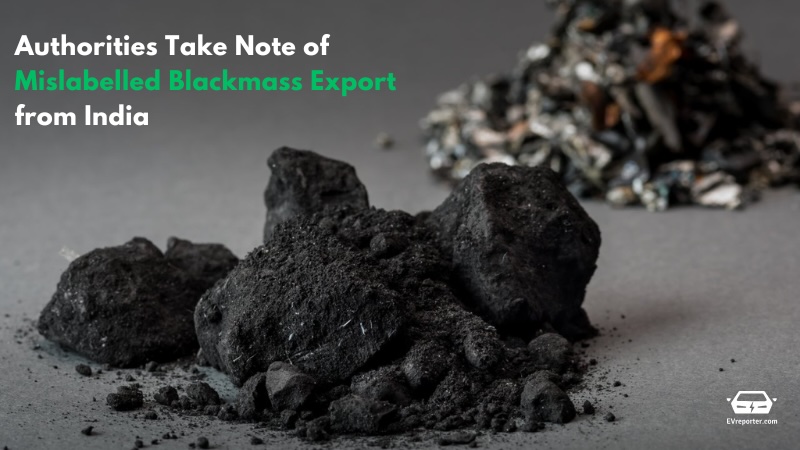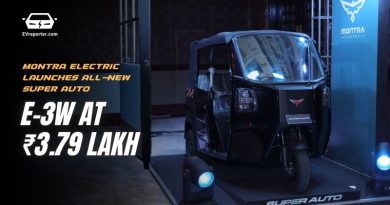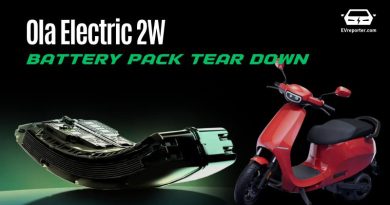Customs Department Takes Note of Mislabelled Black Mass Exports from India | EVrepoter Exclusive
The Central Board of Indirect Taxes and Customs (CBIC) and the Central Board of Excise and Customs have been formally sensitised about a rampant malpractice prevalent in India’s lithium-ion battery recycling industry, according to an official department letter seen by EVreporter. Mislabelled export of battery black mass has long been flouting both hazardous-waste rules and export-control licences.
A prevalent malpractice
Many lithium-ion battery shredding units are exporting hazardous “black mass” under incorrect trade codes, starving domestic recyclers of critical raw materials and undermining India’s goal of becoming a global hub for battery recycling. Black mass—the powdery residue left after the end of life lithium-ion batteries are shredded—contains recoverable cobalt, nickel, lithium and other materials, but is legally classified as hazardous waste (HS Code 8549). Exporting it, therefore, requires explicit permission from the Ministry of Environment, Forest & Climate Change (MoEF&CC) and a licence from the Directorate General of Foreign Trade (DGFT).
Yet, multiple shredding facilities have been mislabeling and exporting the material as non-hazardous “products”—often under unrelated HS codes—and simultaneously selling Extended Producer Responsibility (EPR) credits to electronics and mobile phone makers. The manoeuvre allows exporters to sidestep scrutiny while pocketing credits they are not entitled to earn.
Impact on the industry
Every tonne of black mass that slips out unchecked is a tonne of feedstock denied to domestic hydrometallurgy units.
According to the data presented in various forums by a leading industry association of recyclers, India’s battery shredding capacity (R2 recycling) is nearly 70,000 metric tons per annum of black mass. Most of the shredding units are operating at less than optimal capacity due to lower feedstock of used batteries. On the other hand, the collective R4 recycling capacity (black mass refining capacity) of Indian players is estimated at 60,000 MT per annum, indicating that the industry has access to less black mass than it can process.
R2 recyclers refer to the players who engage in only Battery Dismantling and Physical separation (i.e., processing until black mass generation). R4 recyclers are those involved in Battery Dismantling, Physical Separation and Refining (i.e. Black Mass Processing).
“Producers end up paying for EPR credits that effectively finance the outbound shipment of critical metals that India needs for its own battery ecosystem,” said a senior industry leader. “This is happening at scale.”
Looking forward
While the government’s recognition of the issue is appreciated, corrective actions and enforcement will be the real test. Potential fixes include:
- The MoEF&CC should not issue any licenses to export black mass to shredding units (R2 recyclers) or fully integrated recyclers (R4 recyclers), as data indicates that there are sufficient refining units in the country to convert all the black mass generated into critical metal compounds.
“I am told that in anticipation of the actions from the customs department to prevent the drain of critical minerals out of India, some non-compliant recyclers are now approaching MOEF& CC for export permissions and to DGFT for the required Export Licence. Both the authorities must not issue licenses as the refining capacities created with government support are already short of feedstock”, said Bhuwan Purohit, Executive Director of R4 recycling company Rubamin, when approached for a quote. Rubamin has blackmass refining capacity of 10,000 MTA at its Gujarat plant.
- Obtaining a declaration from exporters of critical metals, particularly Lithium, Cobalt, Nickel and Manganese or any mixture thereof, that the material did not originate from the recycling of lithium batteries.
- The CPCB or customs should conduct annual audits of all exports by R2 and R4 recyclers, based on filed returns, to ensure no hazardous waste is being passed off as a commercial product.
- State pollution control boards must be directed to audit the approvals granted to all Recyclers and their quarterly returns to ensure that they are not permitted to sell any product other than black mass/waste from Lithium-ion Batteries with HS code 8549 1400.
- Restricting shredders’ domestic invoices to a single HS code—8549 1400—with one of four explicit descriptions:
– Waste from lithium-ion cells – Black mass
– Waste from lithium-ion cells – Plastic waste
– Waste from lithium-ion cells – Ferrous waste
– Waste from lithium-ion cells – Copper foil / Aluminium foil
Nitin Gupta, Co-founder & CEO of Attero, an e-waste and lithium battery recycling company based out of Noida, UP, also underlined the importance of stopping the unchecked flow of critical materials from the country in the interest of building an end-to-end circular battery ecosystem. “Attero has built a capacity to refine up to 15,000 MT of battery blackmass a year, backed by proprietary technology with over 46 + global patents and another 200 applied for. There is sufficient demand within India to take in all the blackmass being produced in the country. The government needs to put a stop to the export as soon as possible to avoid surrendering valuable feedstock to overseas hydrometallurgy plants in South Korea and China.”
Customs, DGFT, and MoEF&CC need to act in tandem so that India can position itself as a responsible and resource-secure recycling destination.
Call for a united industry front
Rahul Jha from ADV Metal Combine Pvt. Ltd, a CPCB-approved R4 recycler [Established in 1997], pioneering lithium-ion battery black mass refining and critical metal recovery in India, feels that the issue with black mass exports goes beyond mislabelling — it’s geopolitical. Chinese and Korean refiners have achieved massive economies of scale, allowing them to offer higher payables for black mass while maintaining low refining costs. This has created a distorted market where Indian recyclers are lured by high export prices. Meanwhile, the offtake for refined products within India remains weak, further amplifying the price disparity. However, not all hope is lost.
“For years, the absence of government support has left Indian refiners exposed. With the launch of the National Critical Mineral Mission, there’s finally a policy window to change this trajectory — but it will take coordination and discipline among recyclers. Instead of competing in a price war for scrap batteries, Indian black mass processors must unite, formalize collection, and build integrated refining capacity“, he adds. “A ban or restriction alone won’t solve the issue; as long as export authorizations remain possible, the race to the bottom will continue. Unless the sector consolidates and works as one front, this battle will only enrich scrap aggregators while genuine refiners and national interest lose out.”
Black mass imagery in the cover image – Source: Argonne National Laboratory
Also Read: Attero refines black mass with 98% efficiency to extract battery-grade materials
Subscribe & Stay Informed
Subscribe today for free and stay on top of latest developments in EV domain.






